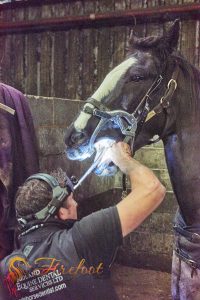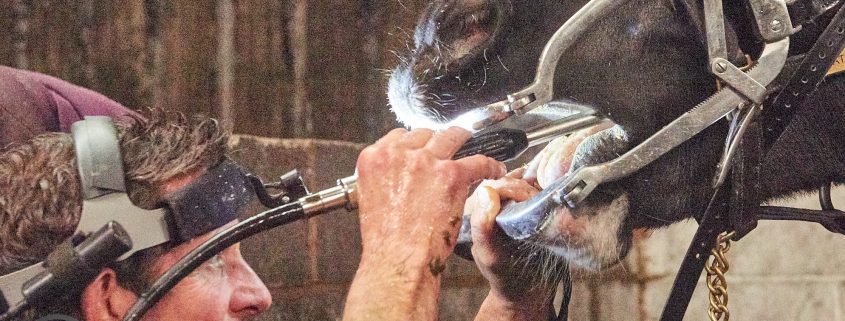Introducing Mat – by Lisa Gregory
I am so lucky that I have an expert support team, which is essential to keep a facility of the size of Cannock Chase Trekking Centre running to my high standards. The health and happiness of all my horses is my priority, and I leave nothing to chance when it comes to their care. I have already introduced you to our fantastic farrier Karl Jones, who is here every week with a programme of foot care that is personalised to each horse.
Now it is the turn of another specialist who is essential to our work here at the centre. We don’t see as much of Mat Carter as we do of Karl, but he is vitally important.
Mat is our equine dentist with his own practice, Midland Equine Dental Services, and his annual visit is an intensive couple of days as he and his final-year apprentice, Jack Trinder, work their way steadily through all the horses.
Mat was a trainee farrier when I first met him in 1996, then he switched to dentistry and he began caring for my horses as soon as he qualified.
I firmly believe that dental care is essential and can help prevent other health problems, such as colic, so Mat starts with my young horses very early to get them used to the procedures. We don’t have any misbehaviour from any of them.
We tend to schedule his visit for early winter, when our busy summer season is over, and he will talk me through any problems that he finds. Sometimes he discovers something that will require a follow up visit; this time, he has found that a couple of horses would benefit from having their teeth brushed regularly. That’s a new task for my yard team!
I am always happy when Mat’s visit comes around. My wonderful stallion Zidane has a history of problems caused by a lack of dental care when he was a young horse, before I bought him. He is always a worry to me, and although he is under the care of my vet, it is always a relief when Mat checks him over.
And it is great that Mat knows our vets and will liaise with them, so they can work together if necessary. It means the best of care for my horses. Now let’s hear from Mat…
MAT CARTER
I was originally going to be a farrier, but in the late 1990s I opted to switch and train as an equine dentist. There was a gap in the market, and I decided to fill it (Lisa – that’s Mat’s terrible dentist joke!).
I saw an equine dentist at work one day and thought it looked interesting, so I started making enquiries. In 1998, I went to West Virginia in the United States to begin my training at the American School of Equine Dentistry, and for three years I travelled backwards and forwards across the Atlantic until I qualified.
Now I have my own practice, and I am a member of the British Association of Equine Dental Technicians and the International Association Of Equine Dentists.
 It’s all gone technological!
It’s all gone technological!
Equine dentistry has progressed and developed dramatically over the years. The old treatments before I joined the profession could be quite barbaric and no longer exist. We have electric tools now to make the procedures quicker and easier, but I still use manual tools on horses that do not like the sound of the electricity. Mine is a bespoke service; some horses will take an electric rasp, others prefer manual. So I do whatever is best for the horse, although manual is obviously much more physically taxing for the dentist.
When I first started working for Lisa, she had about 16 horses. Now she has probably the biggest privately owned yard that I visit, and I also go to several former trekking centre horses in their retirement homes. It’s a busy time when we come here; we do 25 one day and 20 the next.
Start them early
Lisa and I like to start with the young horses when they are yearlings. It is really beneficial. If they are checked from an early age, you never have any problems with them standing quietly to be treated.
And if you start early, you spot problems early. For example, Colorado, who is the youngest of the home-breds, will at some stage need his wolf teeth dealing with. I like to take out wolf teeth when a horse is three or four years old, before it becomes a more difficult procedure and before they start interfering with a horse’s work.
Check the small print
It is hugely important that owners should have their horses teeth cared for professionally. I think perhaps some people don’t realise that more and more equine insurance policies insist on it. Read the small print!
When I first started in this business people rarely used to think about getting their horse’s teeth checked. But I do think there is much more awareness nowadays, and that is a great thing for horse welfare. It is so important to their general health.
* Mat has his own website, Midlandshorsedentist.com, and can also be found on Facebook and Instagram.


